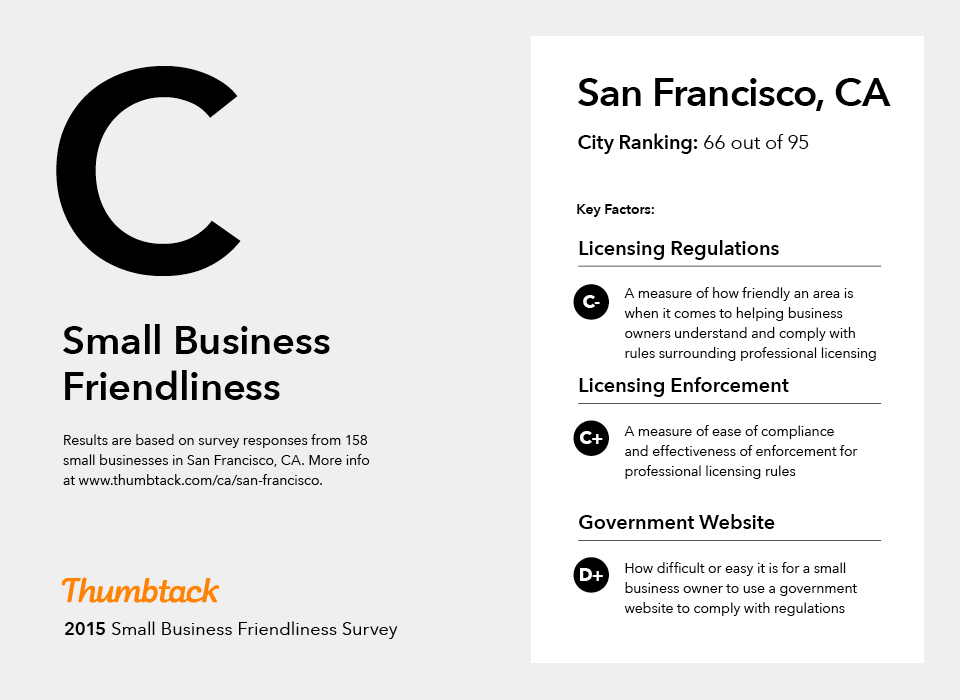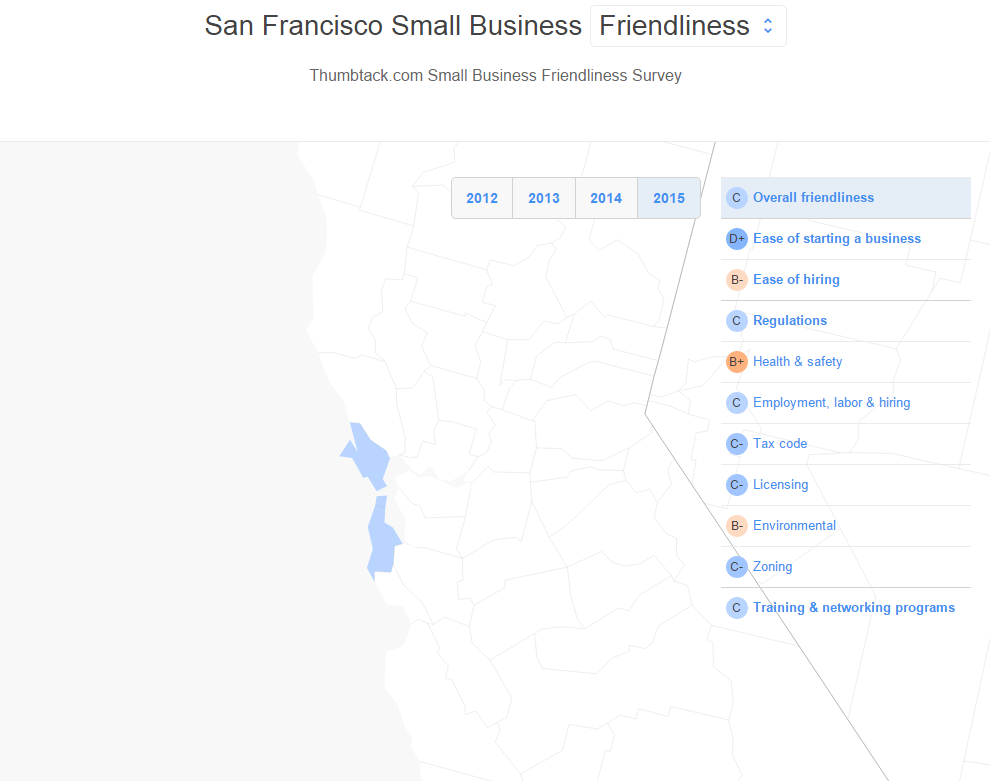San Francisco Earns a C for Small Business Friendliness, B+ for Health Regulations
Manchester, Dallas, and Richmond top rankings in Thumbtack annual Small Business Friendliness Survey; New York City, Los Angeles, and Chicago among the least friendly cities
SAN FRANCISCO, Calif. — September 1, 2015 –– Small business owners gave San Francisco a C for its business friendliness; despite its average score among cities nationwide, the city placed among California’s friendliest cities for small enterprises, according to Thumbtack’s annual Small Business Friendliness Survey. Complete results for San Francisco will be published at https://www.thumbtack.com/ca/
Nearly 18,000 U.S. small business owners responded to this year’s survey, including 158 in San Francisco and 2,398 in California. The study asked respondents to rate their state and city governments across a broad range of policy factors. Thumbtack then evaluated states and cities against one another along more than a dozen metrics.
“Small business owners on Thumbtack have consistently told us that they welcome support from their governments but are frequently frustrated by unnecessary bureaucratic obstacles,” said Jon Lieber, Chief Economist of Thumbtack. “San Francisco small businesses tell us the city is about average in its friendliness, with room to lessen the regulatory burden on small business and improve opportunities for training and outreach.”
“I understand that there needs to be verification of identity, but it would be nice if everything could be taken care of online,” commented a personal trainer in San Francisco. “I was also unaware that the state offers training or networking for small businesses.”
Key Findings for San Francisco:
- San Francisco earned a C overall for small business friendliness, ranking #66 out of 95 cities ranked this year.
- San Francisco’s overall grade in 2015 improved from last year’s rating, when it earned a C-.
- San Francisco’s best scores were a B+ for health regulations and a B- for ease of hiring.
- California’s best scores were a C for ease of hiring and a C- for training and networking programs.
- The worst score for San Francisco was a D+ for ease of starting a business.
- San Francisco outperformed seven California cities in this year’s ranking, including Los Angeles and Oakland, but was behind both Santa Rosa and San Jose.
|
Best and Worst Climates for Small Business
Key Drivers of Business Friendliness
Licensing was again more important than taxes – When evaluating their cities, small businesses said the ease of compliance with licensing rules mattered far more than tax rates. Tax equity – the actual rate at which business owners pay taxes – mattered far less than any measure of regulatory compliance. For example, labor rules were 88 percent more important in driving state friendliness scores when compared to tax rates. Effective licensing was just as friendly as no licensing – Small business owners who found licensing compliance to be “very easy” were just as favorable towards their city governments as respondents who weren’t required to be licensed at all. By contrast, licensed professionals in cities with complicated requirements or inconsistent enforcement reported the lowest approval rates. Training experience was the top factor in both state and city rankings – Offering training on developing a business and navigating the local economic and policy environment was the single biggest factor that influenced perceptions of friendliness. In cities, training was 78 percent more important than the number two factor. On the state level, small businesses who had a positive training experience were 1.5 times more likely to rate their states as being very supportive. High quality websites matter – Investing in a high quality, easy-to-use website that provides useful information and decreases the costs of regulatory compliance improves overall perceptions of a local or state government. Business owners who said their city had a “great” website ranked their cities 13 percent higher, while there was no difference in the rankings of business owners who were either unaware of or had had a bad experience on city websites. Survey MethodologyThumbtack surveyed 17,633 small businesses across the United States. The 36-question survey asked about the friendliness of states and cities toward small business, including specific questions about the regulatory environment for labor, tax, and licensing rules. Thumbtack evaluated states and cities against one another along more than a dozen metrics. Respondents to the survey were largely very small service businesses with five or fewer employees. Every state in the country was represented, although only states with more than 50 responses and cities with more than 30 responses were given a grade. Visit https://www.thumbtack.com/ About ThumbtackThumbtack is a technology-based marketplace that connects Americans with experienced local professionals to help them accomplish more than 5 million personal projects each year. More than 150,000 small business professionals actively use Thumbtack each quarter, across nearly a thousand categories including house remodeling, event planning, and music lessons. Founded in 2009 and headquartered in San Francisco, Thumbtack has raised a total of $150 million from Sequoia Capital, Tiger Global Management, Javelin Investment Partners, and Google Capital.
|
|||||||||||||||||||||||||||||||||||||||||||||||||||||||||||||||||||||||



